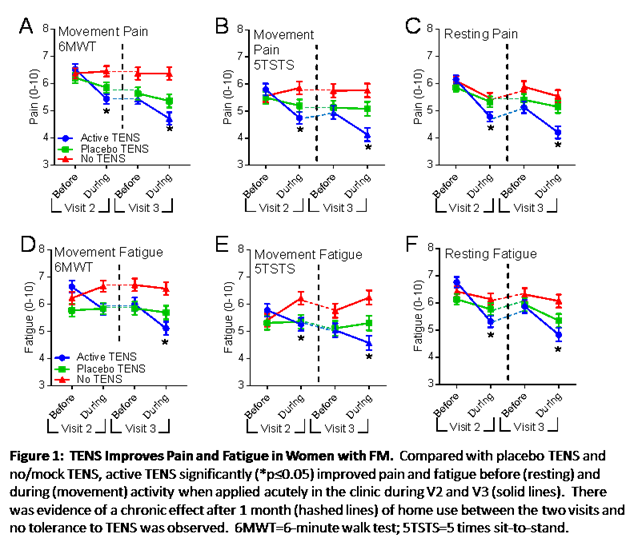Session Information
Session Type: ACR Late-breaking Abstract Session
Session Time: 4:00PM-6:00PM
Background/Purpose: Fibromyalgia (FM) is a chronic pain condition associated with pain and fatigue, especially during physical activity. Treatments designed to modulate central pain pathways to reduce activity-induced pain could improve function and quality of life in this population. TENS activates endogenous central inhibitory pathways and decreases central excitability thus we tested if using TENS during physical activity would improve activity-induced and resting pain and fatigue and lessen disease impact.
Methods: Women aged 18-70, meeting ACR 1990 FM criteria with reported pain ≥4 of 10 at two pre-randomization visits were randomly assigned to active TENS (n=103), placebo TENS (n=99) and no TENS treatment (n=99). Active TENS was applied on the upper and lower back at a mixed frequency, strong but comfortable intensity, 200μsec pulse duration. Placebo TENS was applied in the same manner as active TENS but delivered electrical current for 45s with a ramp to 0 in the last 15s. The no TENS group wore a non-active TENS unit during testing to blind the outcome assessor. Participants were instructed to use TENS during activity for at least 2h per day. Pain and fatigue during activity (6-minute walk test) and at rest were reported before and during application of TENS on the day of randomization and after one month of home use. Patient-reported outcomes were assessed with the brief pain inventory (BPI), multidimensional assessment of fatigue (MAF), revised FM impact questionnaire (FIQR), and a global rating of change. Using mixed model analyses, we examined the effect of TENS using an intention to treat analysis.
Results: After 1 month of active TENS, the primary outcome of activity-induced pain showed a mean reduction of 1.82 (95% CI: 2.39-1.25) that was significantly greater than placebo TENS (0.85, 95% CI: 1.43-0.27; p=0.01) and no TENS (0, 0.56 – +0.41; p<0.01;). Similarly, activity-induced fatigue showed a mean reduction of 1.53 (2.23-0.83) that was significantly greater than placebo TENS (0.08, 0.79-0.63; p<0.01;) and no TENS (+0.35, 0.34 – +1.04; p<0.01;). With active TENS there were also significant improvements in resting pain, BPI interference, and MAF compared to placebo TENS and no TENS (all p<0.05). Active TENS improved the FIQR by a mean of 8.48 (12.92-4.04), which was significantly different from no TENS (1.39, 4.40- +1.62; p<0.001;) but not placebo TENS (3.42, 6.54-0.30; p=0.07). The global rating of change indicated that 70% of those in the active TENS group improved compared to 31% in the placebo TENS group and 9% in the no TENS group (p<0.001).
Conclusion: Active TENS produced significant improvement in pain, fatigue, and disease impact compared to placebo TENS or no TENS. Most women who received active TENS reported global improvement in their condition. As a safe, inexpensive, home based-treatment, TENS may be included as part of the management strategy for women with FM.
To cite this abstract in AMA style:
Crofford L, Daily D, Vance C, Chimenti R, Merriwether E, Zimmerman MB, Williams J, Golchha M, Alemo Munters L, Geasland K, Rakel B, Sluka K. Transcutaneous Electrical Nerve Stimulation (TENS) Reduces Pain and Fatigue and Improves Disease Impact in Women with Fibromyalgia: A Randomized Controlled Trial [abstract]. Arthritis Rheumatol. 2018; 70 (suppl 9). https://acrabstracts.org/abstract/transcutaneous-electrical-nerve-stimulation-tens-reduces-pain-and-fatigue-and-improves-disease-impact-in-women-with-fibromyalgia-a-randomized-controlled-trial/. Accessed .« Back to 2018 ACR/ARHP Annual Meeting
ACR Meeting Abstracts - https://acrabstracts.org/abstract/transcutaneous-electrical-nerve-stimulation-tens-reduces-pain-and-fatigue-and-improves-disease-impact-in-women-with-fibromyalgia-a-randomized-controlled-trial/

